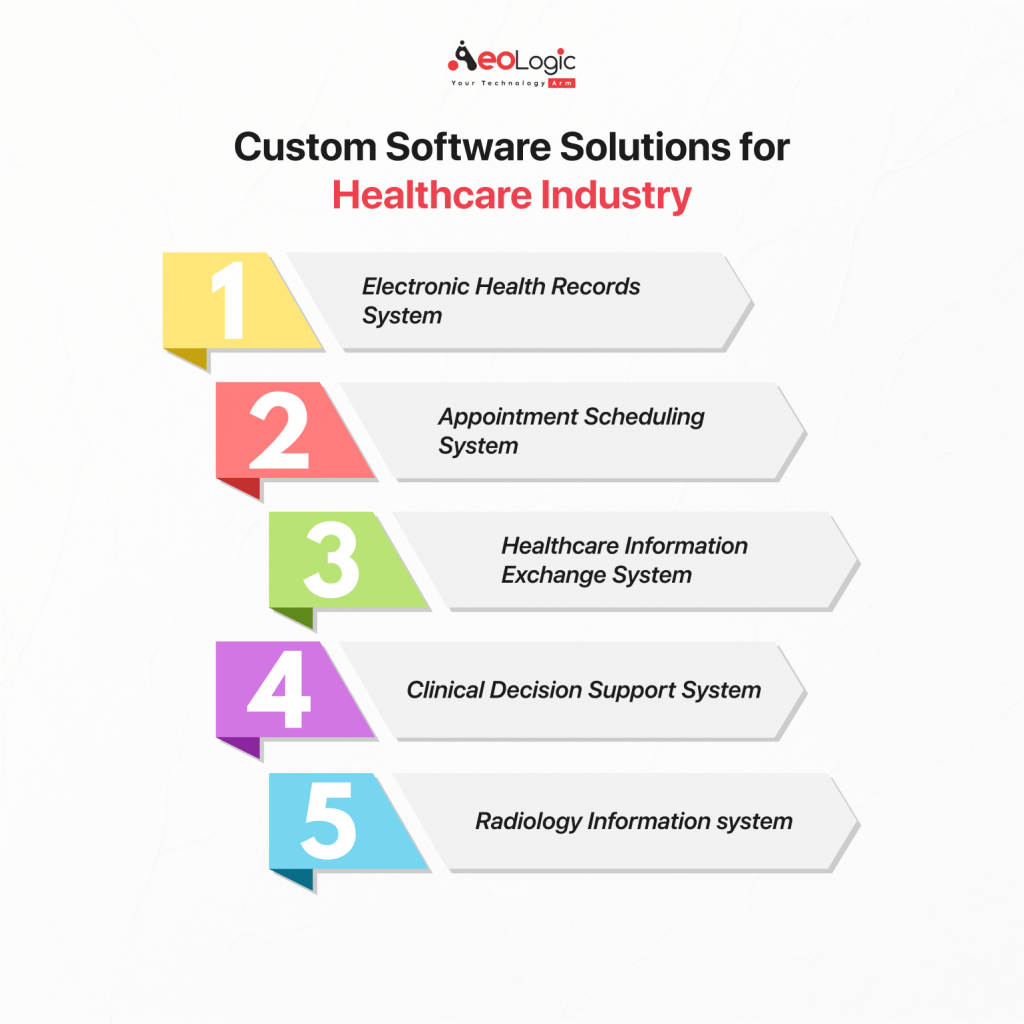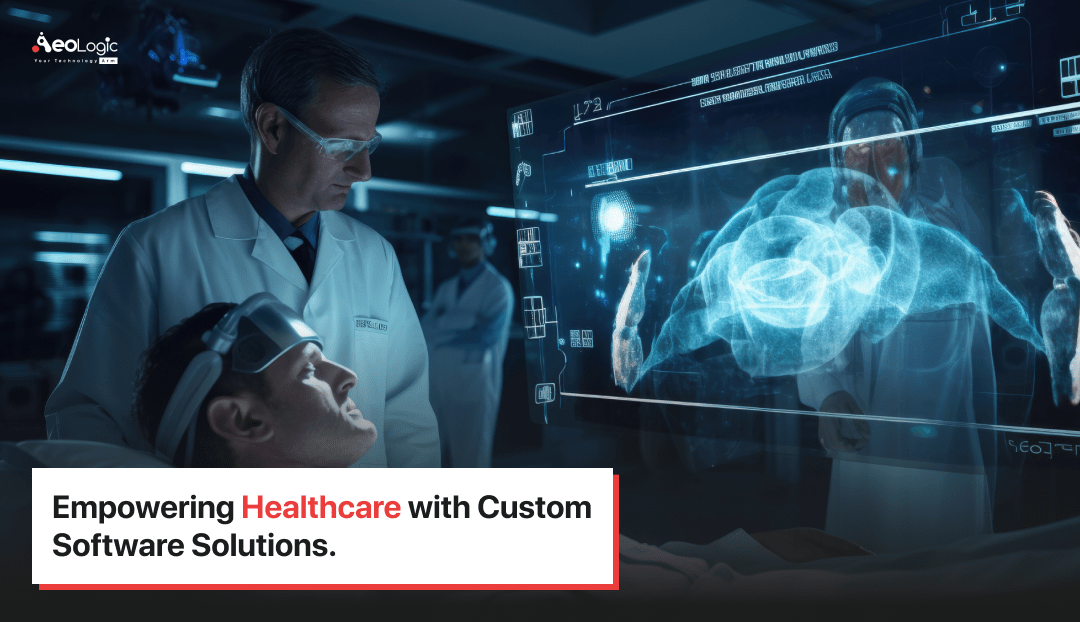Healthcare software development enables healthcare professionals to provide greater patient care while also providing an excellent user experience. This industry has made an important impact on the global market too. The healthcare services market size has grown strongly in recent years. It will increase from $8778.73 billion in 2024 to $9255.77 billion in 2025 at a compound annual growth rate (CAGR) of 5.4% and is expected to reach USD 44,760.73 billion by 2032 and grow at a CAGR of 9.07% over the forecast period 2024-2032.
The modern healthcare industry uses various modern tools and technologies, and custom software solutions are one of them. Many solutions are powered by different technologies like artificial intelligence, IoT, blockchain, RFID, traceability, etc.,., and they are contributing efficiently to the growth of the healthcare industry and patient care. However custom software solutions have more potential and accuracy to deliver results more efficiently than ever.
Importance of Custom Software Solutions for Healthcare
The goal of custom software development is to provide tailored solutions for specific operations. This can enhance various aspects of the healthcare industry, like appointments, treatments, diagnosis, keeping records, data analysis, reports, inventory management, etc. Many types of custom software solutions are available in the healthcare industry, like telemedicine platforms, appointment scheduling systems, custom reporting systems, billing and claims management systems, etc. These software solutions can be developed by using various technologies for different benefits and use cases. Every healthcare organization can develop its own custom software solutions that create a great environment for managing all operations.
The custom software development market has grown exponentially in recent years. It will grow from $44.52 billion in 2024 to $54.26 billion in 2025 at a compound annual growth rate (CAGR) of 21.9%, and it is projected to grow at a CAGR of 22.5% from 2024 to 2030. The global healthcare custom software solutions market is expected to reach $420.23 billion in 2024, $834.35 billion by 2029, and $1,834.3 billion by 2030.
We have seen various details about the role of custom software solutions in empowering the healthcare industry. There are many other details, like some top custom solutions in the healthcare market and what challenges could be faced with those solutions. In the end, we will end the discussion with a concluding paragraph.
Also Read: Custom IT Solutions for Healthcare Management Systems
What Are Custom Software Solutions for Healthcare?
Custom healthcare software solutions refer to software applications created specifically to satisfy the requirements of healthcare organizations. They can help with patient involvement, billing, and data management. Overall, custom healthcare software development solutions offer tailored solutions that meet the particular requirements of healthcare organizations. We will see many types of custom software solutions worldwide later in the upcoming paragraph.
Also Read: Top Advantages of Mobile App for Healthcare Industry
Top Custom Software Solutions for Empowering the Healthcare Industry

There are many custom software solutions for empowering the healthcare industry. Here are a few mentioned below.
Electronic Health Records System
Traditional record storing is not an efficient way to store records, as it involves storing information on papers and physical files. This takes too much time to find the details of a particular patient which overall delays the treatment process. Custom electronic health record systems store records in digitized form, and make it easy to find any patient’s data. It ensures faster access, fewer errors, and better coordination across departments and institutions in an organized manner.
Appointment Scheduling System
Appointment is a critical task for patients and healthcare organizations too. With the conventional appointment method, patients have to wait in line; some commit fraud by double entry, etc., which overall generates crowds and also takes too much time. Custom appointment scheduling system enables the scheduling process efficiently while preventing double bookings. This reduces the headache for healthcare organizations.
Healthcare Information Exchange System
Information flow in various healthcare organizations should be in a streamlined and smooth manner for better diagnosis, not delay in treatment, and proper patient care. Conventional methods do not provide that convenient exchange of information whereas a custom healthcare information exchange system or solution enables the flow of patients’ information among hospitals, clinics, pharmacies, etc. This increases the operational efficiency within the healthcare organization.
Checkout our list of Top Healthcare App Development Companies
Clinical Decision Support System
Decision-making is one of the major aspects of the healthcare industry, as one wrong or right decision can make a positive or negative impact on patients’ treatment. The human mind can panic in an emergency situation and cannot analyze the decision. Where custom clinical decision support systems or solutions can help to make the right decision by providing important guidelines, information, proof, etc. This really can be a game changer for future patient treatment.
Radiology Information system
There are many departments in healthcare organizations, and radiology is one among them. It is very important to manage X-ray images and information in the radiology department to treat patients. Custom solutions powered by radiology information systems can manage images by integrating with picture archiving and communication systems. This also helps to retrieve past information and images.
Challenges with Custom Software Solutions for Healthcare Industry
So we have seen a lot of custom software solutions for the healthcare industry, but there could be some challenges too while implementing and after implementation. Here are a few challenges mentioned below.
- Customization complexity can be a challenge for an organization. The more customization added to solutions, the more complex it becomes to implement.
- Finding a good custom software solutions development organization can be another challenge, as there are only a few goods in the market that efficiently do the job.
- Long-term maintenance of custom software solutions can result in challenges as it requires updating, monitoring, and a lot of cost.
Also read: Blood Pressure Monitoring App Solutions for Health Management
Final Words: Custom Software Solutions for Healthcare
Custom software solutions are changing the world and every industry in an efficient manner by providing specialized solutions for specific problems and aspects. The healthcare industry has various operations, and each operation can be enhanced by custom software solutions development.
When it comes to healthcare software solutions that not only meet but surpass your expectations, Aeologic is the name to remember. We’re more than just a software development company. With considerable experience in developing cost-effective and feature-rich solutions, here are the aspects that distinguish Aeologic from the industry:
- Customized Solutions: Tailored software to meet your unique healthcare needs.
- Latest Technology: We use AI and IoT solutions for innovation.
- Compliance-Focused: Fully secure and HIPAA/GDPR-compliant systems.
- Seamless Integration: Solutions that work effortlessly with your existing systems.
- Cost-Effective: High-quality solutions within your budget.
- Ongoing Support: Reliable updates and assistance for long-term success.
Partner with Aeologic and transform healthcare through smarter, efficient solutions.
Scale your digital capabilities with a software development company delivering customized and cost-effective solutions.
FAQs
What types of healthcare organizations benefit most from custom software solutions?
Custom software solutions are revolutionary for different healthcare organizations, including those that need specialized software to fulfill distinct operational and patient needs. For example, hospitals are able to install a system tailored specifically for the way they manage patients, admissions, scheduling, and discharges.
Clinics, such as those specializing in pediatrics, cardiology, etc., can use their custom software to monitor patient records and treatment plans. Telehealth providers can utilize their custom software to conduct video conferencing and sometimes remote patient monitoring securely to patients.
Pharmacies can use customized inventory control and prescription management software and communicate with patients via custom delivered medications. Research organizations have specialized software to manage data, analyze it, and comply with regulatory standards.
- Hospitals: Reduced workflow processes and better integration of patient data.
- Clinics: Customize tools for their specialty care needs.
- Telehealth Providers: Secure platform for the delivery of their virtual care services.
- Pharmacies: Effective control of inventory and prescription management.
How do custom software solutions ensure compliance with healthcare regulations like HIPAA?
Custom software solutions are developed with the highest expectations for security and compliance with health regulations like HIPAA, GDPR, or your region’s standards. They include functionalities to secure and comply with these regulations based on the needs of the organization.
Custom software solutions take data protection seriously, unlike generic software. There is full end-to-end encryption to maintain the security of patient information when it is in storage and during transmission. Generic software solutions allow all users access, while custom solutions restrict access to specific roles, which may also include multi-factor authorization.
Custom software will also provide Permanent Audit Trail Reports, which will monitor everything that happens in the system. The audit trail provides transparency and can be an asset when preparing for a regulatory audit.
Custom software can be regularly updated and patched to align with new or incipient security threats to help maintain compliance over time.
Custom software can also be customized with features with regards to specific regional or institutional requirements regarding health data protection. This way reducing potential penalties for non-compliance.
Custom solutions not only protect sensitive health data, but they also help build trust with patients and regulators alike to protect health organizations to operate legally and ethically while delivering outstanding healthcare.
Can custom software integrate with existing healthcare systems like EHRs or EMRs?
Custom software has been developed for purposes. The primary goal is the intended purpose of healthcare software – connecting to healthcare systems including Electronic Health Records (EHRs), Electronic Medical Records (EMRs), and other systems while ensuring interoperability.
Integration is essential for workflows to stay together and information to not be siloed. Custom software can be connected to your EHRs/EMRs for seamless and ongoing sharing of patient data. Staff can have up-to-the-minute access to a patient’s history and appropriate information to enable providers to eliminate guesswork for a precise decision.
The software can also maintain connections to diagnostic tools, billing systems, telehealth systems, etc., to create a seamless ecosystem around healthcare.
- Real time data sharing: Synchronization is instantaneous with documentation between systems.
Interoperability standards. The software can adhere to the protocols associated with interoperability (HL7, FHIR, etc.) for compatible records to be exchanged. - Custom APIs: The software can facilitate a secure data connection to legacy systems or third-party systems as appropriate.
- Scalability: The software can support any future needs when system requirements evolve.
This flexibility empowers healthcare organizations to utilize their existing system, with increased functionality improvement to the workflow, a higher function per hour, a better quality outcome of care, or a better experience for the patient or provider; without replacing an existing system already in place.
How long does it take to develop and implement a custom healthcare software solution?
The entire process of developing and implementing a custom healthcare software solution will typically take anywhere from 6 months to over a year depending on the complexity of the project, the scope of the implementation, and the requirements at hand.
The entire process has various stages of development that will require planning, and execution. In order for a custom healthcare software solution to meet a health care standard, or organization’s needs, it must follow the process from start to finish.
- Requirement Analysis (1-2 months): The requirement analysis phase collects stakeholder requirements, sets up definitions of the goals, and looks at integration with other systems like electronic health records. Also, regulatory compliance, like HIPAA compliance, needs to be mapped out in this phase.
- Design and Development (3-8 months): The development team builds the software architecture, wires up functional coding features, whilst collaborating on all features such as data security, and the user interface design. The timeframes will naturally range between projects, particularly when looking to build something complex, like AI and telehealth solutions.
- Testing and Quality Assurance (2-4 months): This phase confirming functions work as intended, security compliance are validated, and other bugs and performance issues identified are cleared.
- Deployment and Training (1-2 months): The custom software is put into production, and staff training is critical for adoption.
Ongoing maintenance and upgrades needed following launch to facilitate ongoing support and changes to ongoing needs and to ensure sustainability of custom healthcare software solution in the long term.

I’m Deepika Pandey, an SEO strategist and content writer with 6+ years of experience. I create SEO-friendly content that drives traffic and engages readers. I combine data insights with creativity to help businesses grow their online presence effectively.






